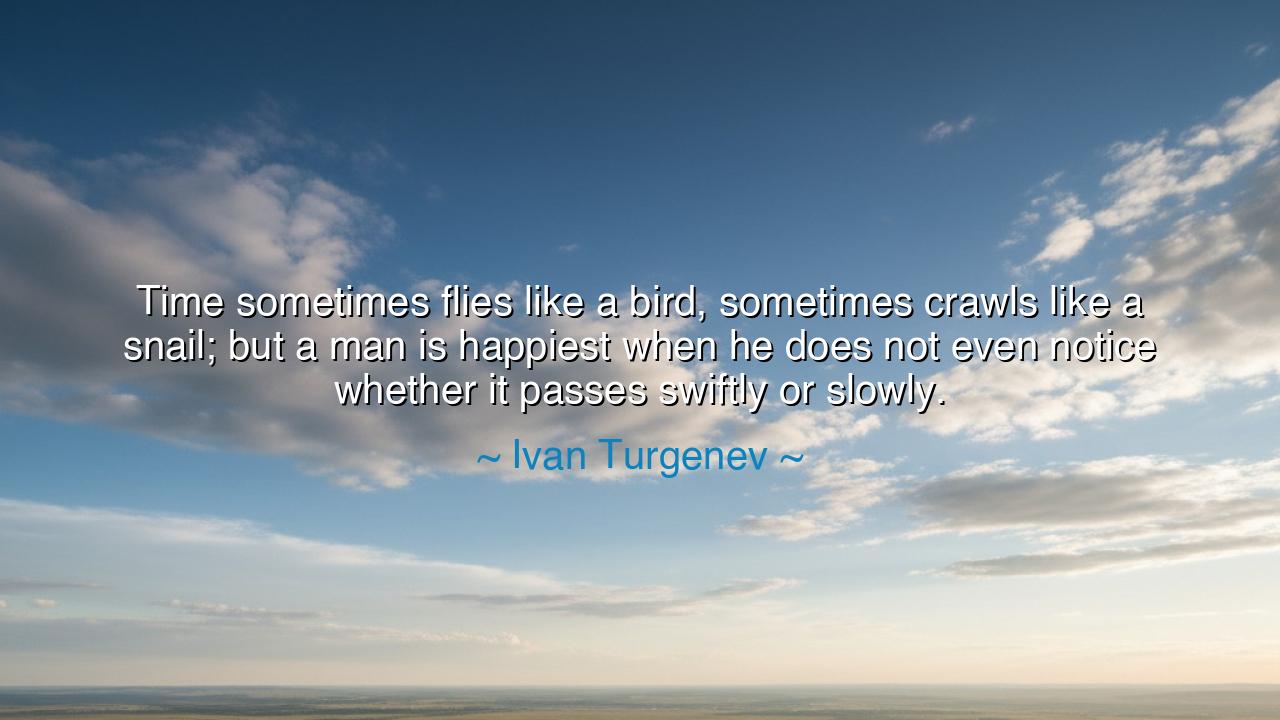
Time sometimes flies like a bird, sometimes crawls like a snail;
Time sometimes flies like a bird, sometimes crawls like a snail; but a man is happiest when he does not even notice whether it passes swiftly or slowly.






The words of Ivan Turgenev—“Time sometimes flies like a bird, sometimes crawls like a snail; but a man is happiest when he does not even notice whether it passes swiftly or slowly.”—are like a soft whisper from the depths of eternity. They remind us of the strange, shifting nature of time, which bends itself to the weight of our hearts. In joy, time spreads its wings, soaring beyond our grasp, and the hours vanish like sparks in the night. In sorrow, time drags its feet, creeping like a wounded snail, making every moment feel heavy, stretched, and endless. Yet Turgenev tells us the secret: true peace comes when we cease to measure time at all, when we are so immersed in life itself that the clock loses its hold over us.
This insight is not new; it is ancient, carried in the wisdom of many ages. The Greeks spoke of kairos, the opportune moment, different from chronos, the ticking measure of passing hours. To live in kairos is to forget the ticking of the clock, to dwell fully in the present, untroubled by whether the moment is long or short. The Eastern sages, too, taught that enlightenment is found when one ceases to cling to past and future, and instead abides in the eternal now. Turgenev, in his simple yet profound image of bird and snail, captures this universal truth with poetic clarity.
Consider the story of Archimedes, lost in the joy of discovery. When he studied the mysteries of numbers and shapes, he forgot hunger, sleep, and even danger. The Roman soldier who took his life found him still tracing circles in the sand, heedless of the passing hours. To him, time was not flying nor crawling; it was forgotten altogether, consumed in the ecstasy of creation. His happiness was not measured by days or years, but by the wholeness of his devotion. In him we see Turgenev’s teaching made flesh: the man who forgets time is the man who lives most fully.
And yet, how often do we live otherwise? We long for hours to end when they bring us hardship; we clutch at fleeting days when they bring us joy. We live as slaves to the pace of time, cursing it when it drags, despairing when it flies. But the wise know that neither speed nor slowness matters. What matters is presence—the ability to dwell so deeply in what we do, in whom we love, in what we create, that the question of time dissolves. Happiness is not in the length of hours, but in the fullness of life within them.
History itself offers another mirror. Think of Nelson Mandela, confined in prison for twenty-seven years. For him, time might have been a torment, each day a crawling snail in the silence of his cell. Yet he turned that long imprisonment into a furnace of patience and strength. He learned not to let the pace of time master him, but to dwell within it with dignity and purpose. When at last he emerged, he carried not bitterness, but wisdom—the triumph of a man who had learned to rise above the tyranny of hours and years.
The lesson is clear. Do not let your happiness depend on whether time flies or crawls. Learn to enter moments so completely that their measure no longer troubles you. When you work, give yourself wholly to your task. When you love, lose yourself in the presence of another. When you create, let the hours vanish in the flow of inspiration. The man who forgets time is not careless; he is free.
Practical action flows from this teaching. Begin by cultivating stillness—set aside moments each day to breathe, to quiet the endless counting of minutes in your mind. Choose work and relationships that draw you into presence, where joy or meaning makes you forget the passage of time. Beware the constant hunger to speed life up, or to slow it down; instead, seek to live it fully. Let go of the chains of the clock, and you will discover the secret Turgenev revealed: the happiest life is not the longest or the fastest, but the one most deeply lived in each passing moment.
Thus, remember his wisdom: time may fly like a bird, or crawl like a snail—but the highest joy is to rise above both, and to live so truly, so fully, that you no longer notice at all. For in that forgetting, you will have found freedom.






AAdministratorAdministrator
Welcome, honored guests. Please leave a comment, we will respond soon